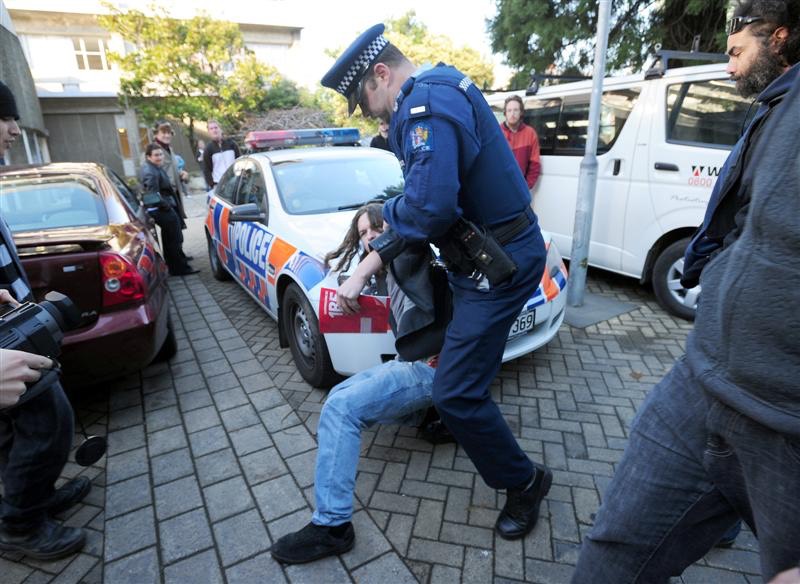New Jersey’s Resisting Arrest laws are governed by N.J.S.A. 2C:29-2, which sets out it's various definitions, and penalties, as described below. More often than not, these cases occur when police use more than necessary force, and meet someone who knows it. Protect your rights, call now for a free consultation, at 201-943-2445.
Can I fight my Resisting Arrest Charge?
To properly defend your NJ Resisting Arrest case you must be intimately familiar with all aspects a such a case may take on; from disproving elements of the States case, to having evidence suppressed. With over 40 Years Experience as a Judge, Prosecutor, and Criminal Defense Lawyer, the Attorneys of Avery & Avery know how to keep you out of trouble. As Criminal Defense Lawyers, we have mastered the identification of flaws in the States case, and will work with you to either avoid a criminal conviction, or have the case thrown out completely.
What are the Penalties?
The penalties for Resisting Arrest in NJ generally depend on the amount of force used or risk to the public involved. For the full statute see here:
Defendant tries to stop or hinder his arrest;
- Up to six months in Jail
- $1,000 Fine
Defendant runs from, eludes, or evades police;
- 18 Months Prison
- $10,000 Fine
- Criminal Record
Defendant uses force against or evades police by use of a vehicle;
- 3-5 Years in Prison
- $15,000 Fine
- 6-24 Month Drivers License Suspension
- Criminal Record
Defendant evades police by use of a vehicle while breaking certain other driving laws;
- 5-10 Years in Prison
- $150,000 Fine
- 6-24 Month License Suspension
- Criminal Record
The penalties for Resisting Arrest in NJ generally depend on the manner of 'resistance’. For the full statute see here:

Frequently Asked Questions
For what reasons can I be charged for resisting arrest in NJ?
There are various reasons the police charge people for resisting arrest, including:
- Arguing with the Police
- Running from the Police on Foot
- Fleeing the Police in a Vehicle
- Ignoring Police Instructions
- Resisting Handcuffing
- Fighting with the Police
See here for a fuller listing of predicates under the resisting arrest statute. Often times the police simply arrest people for asserting their rights and submitting to unjustified interrogations or demands. When this is the case, we can often demonstrate this to the Judge via testimony or police videos. Call today for a free consultation with one of our NJ resisting arrest defense lawyers.
I was charged with resisting arrest, what will happen next?
The good news is that if the case is remaining in your town, that it is merely a disorderly persons charge. If the charge is for a 2nd, 3rd, or 4th degree offense the case will be refered to the county prosecutor and will be adjudicated at the Bergen County Court House in Hackensack or that the county where the alleged incident occurred.
If your case is sent to Hackensack or your Countys Superior Court, it is all the more important to hire an attorney. There would be criminal charges against you that may follow you for the rest of your life, or end you up in jail. Luckily the defense lawyers of Avery & Avery have great success is having these charges ultimately downgraded and sent back to your local Municipal Court and afterwards working with them to further minimize the consequences or eliminate the charge altogether.
The police were being abusive, is that a defense?
The unfortunate truth is that many people charged with ‘resisting’ were merely having natural reactions to overeager policing. In most cases it is within the officers discretion to arrest, however with more and more NJ police departments video taping all interactions with the public, we are given more tools to fight these injustices. For more infortmation on this, we invite you to call us at 201-943-2445.
The police are about to arrest me, what do I do?
In most situations when being arrested we advise our clients to not say a thing. You do not have to and should not be coerced or threatened into talking with the police. If you are being arrested call our attorney's immediately for representation. Even one wrong statement to the police can harm you and result in a conviction later on.
If you have already spoken with them after your arrest, we may be able to have your damaging statements thrown out in certain circumstances.
What is the difference between 2nd, 3rd, 4th, and Disorderly Persons Resisting Arrest charges in NJ?
The difference is in the gradation of the offense. The gradation of a NJ Resisting Arrest offense, as outlined above, generally depends on the risk of injury to police and the general public. The more risky the means of resisting, the higher the penalties. For instance, fleeing police on foot carries far fewer risks than a high speed chase (circa OJ Simpson)
I am under 18 years old, how does the NJ Criminal Mischief law affect me?
New Jersey's Juvenile justice system differs significantly from the adult system. Minors charged with Resisting Arrest will most often be instead adjudicated for juvenile delinquency. Juvenile Delinquency can carry many of the same penalties as the predicate offense, but is generally far more lenient. For more information about Juvenile Delinquency charges, please see here.
If they have caught me and there are no defenses, what can I do?
In some situations the police have caught the defendant dead to rights and there are no defenses. In situations like these we have often been successful in downgrading the offense to a far lesser penalty and no jail time. Another approach is to enter our client into a diversionary program such as Pre Trial Intervention (PTI) or Conditional Discharge (CD). These programs provide the benefit of no jail time and no criminal record. We have been successful with combinations of the two as well when dealing with high level offenders.
I have been convicted for Resisting Arrest before, but in another state, how does this affect the case?
While there is no step up provision in the statute, a NJ court will likely count it as a prior and be more inclined to impose greater than the minimum penalties. This could mean the difference between a possible 5 year sentence and a 10 year sentence. If you have been convicted before for this before, no matter the State, it is imperative you contact an Experienced NJ Criminal Defense Lawyer.
How does a Resisting Arrest charge / conviction affect my immigration status?
The United States has very restrictive immigration laws, and a NJ Resisting Arrest charge can have dire consequences, including possible deportation and inadmissibility back into the US.
Resisting Arrest charges can be very dangerous for non-citizens, as it may be considered both a crime involving moral turpitude and an aggravated felony. The Department of Homeland Security is mandated to remove non-citizens who commit certain crimes, including aggravated felonies (crimes that involve more than 1 year in prison) and crimes of violence (crimes by their nature which involve a substantial risk that physical force against the person or property of another may be used). Because of this it is even more urgent for Green Card holders, Visa holders, Permanent Residents, or non-citizens to be represented by a shoplifting defense lawyer, and fight the charges.
If you have been charged with any criminal offense in NJ and are not a citizen, don’t risk immigration consequences. Our lawyers have a near perfect success in protecting our clients from the immigration consequences of Resisting arrest.
